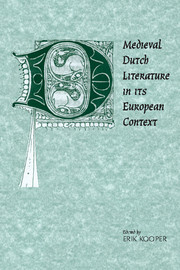Book contents
- Frontmatter
- Contents
- List of contributors
- Preface
- Map
- Introduction
- PART I COURT AND CITY
- PART II THE WORLD OF CHIVALRY
- PART III REYNARD THE FOX
- PART IV THE LITERATURE OF LOVE
- PART V RELIGIOUS LITERATURE
- 11 The saint and the world: the Middle Dutch Voyage of Saint Brendan
- 12 Hadewijch: mystic poetry and courtly love
- 13 The Modern Devotion and innovation in Middle Dutch literature
- PART VI ARTES TEXTS
- PART VII DRAMA
- Appendix A Bibliography of translations
- Appendix B Chronological table
- Index
13 - The Modern Devotion and innovation in Middle Dutch literature
Published online by Cambridge University Press: 13 October 2009
- Frontmatter
- Contents
- List of contributors
- Preface
- Map
- Introduction
- PART I COURT AND CITY
- PART II THE WORLD OF CHIVALRY
- PART III REYNARD THE FOX
- PART IV THE LITERATURE OF LOVE
- PART V RELIGIOUS LITERATURE
- 11 The saint and the world: the Middle Dutch Voyage of Saint Brendan
- 12 Hadewijch: mystic poetry and courtly love
- 13 The Modern Devotion and innovation in Middle Dutch literature
- PART VI ARTES TEXTS
- PART VII DRAMA
- Appendix A Bibliography of translations
- Appendix B Chronological table
- Index
Summary
Literary scholars do not show a great interest in Middle Dutch religious literature. This situation is remarkable, especially if one realizes that religious literature constitutes by far the majority of the extant Middle Dutch texts. Seventy to eighty per cent of the manuscript production in the Low Countries in the Late Middle Ages concerned religious prose. This percentage is high in comparison with that in other countries, and this is mainly due to the Modern Devotion. In the late fourteenth, but particularly in the fifteenth century this innovatory religious movement produced a flow of religious literature in the vernacular. As regards the attention paid to this literature Dutch literary criticism compares poorly with that of neighbouring countries like England and Germany. How can this be explained?
From the Romantic period onwards traditional literary scholarship has made a distinction between form and content. In this view it was the artistic form which elevated a certain content above its temporal constraints to art. As a masterpiece of language it thus belonged to literary art, to literature. The content was considered of secondary concern, but should at any rate not eclipse the beauty of the form and by no means distract. This, it was thought, did happen in the case of religious literature, where content was supposed to be more important than form.
- Type
- Chapter
- Information
- Medieval Dutch Literature in its European Context , pp. 226 - 242Publisher: Cambridge University PressPrint publication year: 1994
- 1
- Cited by



